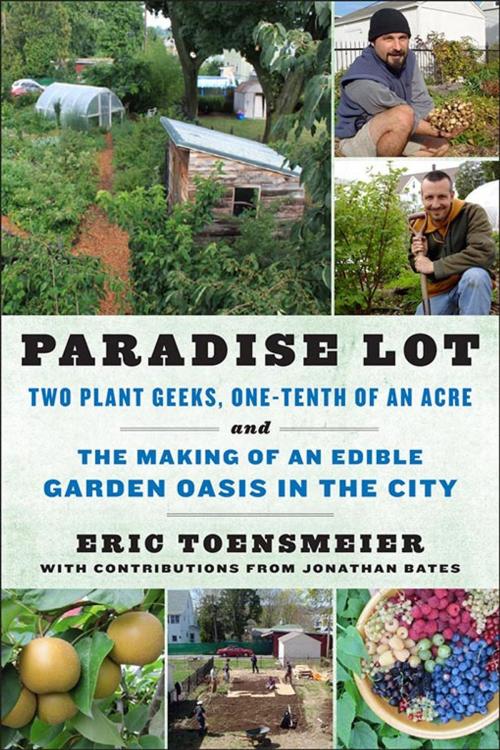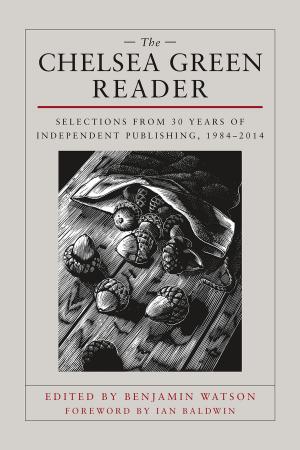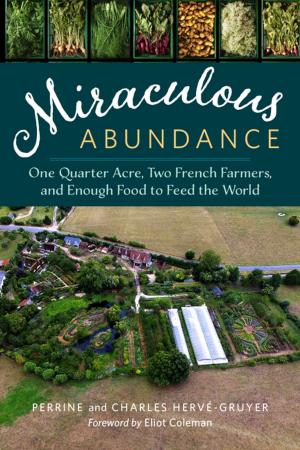Paradise Lot
Two Plant Geeks, One-Tenth of an Acre, and the Making of an Edible Garden Oasis in the City
Nonfiction, Home & Garden, Gardening, Techniques| Author: | Eric Toensmeier, Jonathan Bates | ISBN: | 9781603584005 |
| Publisher: | Chelsea Green Publishing | Publication: | February 8, 2013 |
| Imprint: | Chelsea Green Publishing | Language: | English |
| Author: | Eric Toensmeier, Jonathan Bates |
| ISBN: | 9781603584005 |
| Publisher: | Chelsea Green Publishing |
| Publication: | February 8, 2013 |
| Imprint: | Chelsea Green Publishing |
| Language: | English |
When Eric Toensmeier and Jonathan Bates moved into a duplex in a run-down part of Holyoke, Massachusetts, the tenth-of-an-acre lot was barren ground and bad soil, peppered with broken pieces of concrete, asphalt, and brick. The two friends got to work designing what would become not just another urban farm, but a "permaculture paradise" replete with perennial broccoli, paw paws, bananas, and moringa—all told, more than two hundred low-maintenance edible plants in an innovative food forest on a small city lot. The garden—intended to function like a natural ecosystem with the plants themselves providing most of the garden's needs for fertility, pest control, and weed suppression—also features an edible water garden, a year-round unheated greenhouse, tropical crops, urban poultry, and even silkworms.
In telling the story of Paradise Lot, Toensmeier explains the principles and practices of permaculture, the choice of exotic and unusual food plants, the techniques of design and cultivation, and, of course, the adventures, mistakes, and do-overs in the process. Packed full of detailed, useful information about designing a highly productive permaculture garden, Paradise Lot is also a funny and charming story of two single guys, both plant nerds, with a wild plan: to realize the garden of their dreams and meet women to share it with. Amazingly, on both counts, they succeed.
When Eric Toensmeier and Jonathan Bates moved into a duplex in a run-down part of Holyoke, Massachusetts, the tenth-of-an-acre lot was barren ground and bad soil, peppered with broken pieces of concrete, asphalt, and brick. The two friends got to work designing what would become not just another urban farm, but a "permaculture paradise" replete with perennial broccoli, paw paws, bananas, and moringa—all told, more than two hundred low-maintenance edible plants in an innovative food forest on a small city lot. The garden—intended to function like a natural ecosystem with the plants themselves providing most of the garden's needs for fertility, pest control, and weed suppression—also features an edible water garden, a year-round unheated greenhouse, tropical crops, urban poultry, and even silkworms.
In telling the story of Paradise Lot, Toensmeier explains the principles and practices of permaculture, the choice of exotic and unusual food plants, the techniques of design and cultivation, and, of course, the adventures, mistakes, and do-overs in the process. Packed full of detailed, useful information about designing a highly productive permaculture garden, Paradise Lot is also a funny and charming story of two single guys, both plant nerds, with a wild plan: to realize the garden of their dreams and meet women to share it with. Amazingly, on both counts, they succeed.















